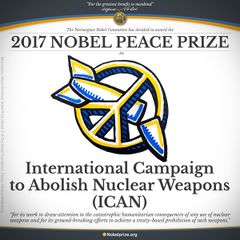Nobel Peace Prize
(Nobel prize) | |
|---|---|
 | |
| Start | 10 December 1901 |
The Nobel Peace Prize is one of the five Nobel Prizes created by the Swedish industrialist, inventor, and armaments manufacturer Alfred Nobel, along with the prizes in Chemistry, Physics, Physiology or Medicine, and Literature.
Contents
Official Story
Since December 1901,[1] it has been awarded annually (with some exceptions) to those who have "done the most or the best work for fraternity between nations, for the abolition or reduction of standing armies and for the holding and promotion of peace congresses".[2]
Criticism
Even the Nobel Committee and the corporate press willingly discuss 'mistakes', like Henry Kissinger (1972) or Barack Obama (2009), who were too obvious war-mongers.
By discussing the 'mistakes' superfically, they deflect from what the prize is really used for - to create a moral,humanitarian image for Western interventions abroad.[3] The winners are often from a country where a regime change operation is in progress, and is meant to give credibility to the notion of a noble opposition that craves for a Western intervention. Examples include the Pakistani girl Malali Yusefai who was persecuted by the Taliban and received the Prize in 2014, a de facto support for the continued occupation of Afghanistan'; or the Organisation for the Prohibition of Chemical Weapons (2013) which gave gravitas to what turned out to be a tool of US/NATO false flag accusations against enemy states (Skripal-affair, numerous false flag gas attacks in Syria, Navalny-affair etc).
A remarkable number of recipients during the Cold War turned out to have a CIA connection.[citation needed]
Annually on 10 December
According to Alfred Nobel's Will, the recipient is selected by the Norwegian Nobel Committee, a five-member committee appointed by the Parliament of Norway. Since 1990, the prize is awarded on 10 December in Oslo City Hall each year. The prize was formerly awarded in the Atrium of the University of Oslo Faculty of Law (1947–89), the Norwegian Nobel Institute (1905–46), and the Parliament (1901–04).
Due to its political nature, the Nobel Peace Prize has, for most of its history, been the subject of controversies.
2017 Award
The International Campaign to Abolish Nuclear Weapons (ICAN) won the Nobel Peace Prize in 2017. Announcing the award, Nobel Committee chairwoman Berit Reiss-Andersen said:
- "ICAN has been a driving force in prevailing upon the world's nations to pledge to cooperate … in efforts to stigmatise, prohibit and eliminate nuclear weapons. She noted that similar prohibitions have been reached on chemical and biological weapons, land mines and cluster munitions, but despite being "even more destructive" nuclear weapons have avoided a similar international ban. "The organisation is receiving the award for its work to draw attention to the catastrophic humanitarian consequences of any use of nuclear weapons, and for its ground-breaking efforts to achieve a treaty-based prohibition on such weapons."[4]
Recipients who met untimely deaths
Nobel Peace Prize recipient:
- Carl von Ossietzky died in the Nordend hospital in Berlin-Pankow on 4 May 1938 in police custody.[5]
- Martin Luther King, Jr. was assassinated by unnamed members of the US government.
- Anwar Sadat and
- Yitzhak Rabin were also assassinated.
Examples
| Page name | Description |
|---|---|
| Nobel Memorial Prize in Economic Sciences | Trojan horse using the prestige of the Nobel name for bankster propaganda |
| Nobel Peace Prize | |
| Nobel Prize for Medicine | Medical prize used to cement dogma that benefits Big Pharma, or for political reasons. |
References
- ↑ https://www.nobelprize.org/nobel_prizes/peace/laureates/1901/address.html
- ↑ "Nobel Peace Prize", The Oxford Dictionary of Twentieth Century World History
- ↑ https://www.globalresearch.ca/the-nobel-peace-prize-in-support-of-war/5661814
- ↑ "Nobel Peace Prize awarded to International Campaign to Abolish Nuclear Weapons"
- ↑ "The Nobel Peace Prize 1935 Carl von Ossietzky"